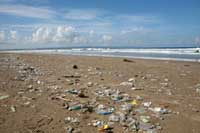Marine Litter - A Global Challenge
 GLOBE-Net - From discarded fishing gear to plastic bags to cigarette butts, a growing tide of marine litter is harming oceans and beaches worldwide, says a new report.
GLOBE-Net - From discarded fishing gear to plastic bags to cigarette butts, a growing tide of marine litter is harming oceans and beaches worldwide, says a new report. The report, the first-ever attempt to take stock of the marine litter situation in the 12 major regional seas around the world, was launched on World Oceans Day by the UN Environment Programme (UNEP) and Ocean Conservancy.
Achim Steiner, UN Under-Secretary-General and UNEP Executive Director, said:
“Marine litter is symptomatic of a wider malaise: namely the wasteful use and persistent poor management of natural resources. The plastic bags, bottles and other debris piling up in the oceans and seas could be dramatically reduced by improved waste reduction, waste management and recycling initiatives”.
“Some of the litter, like thin film single use plastic bags which choke marine life, should be banned or phased-out rapidly everywhere-there is simply zero justification for manufacturing them anymore, anywhere. Other waste can be cut by boosting public awareness, and proposing an array of economic incentives and smart market mechanisms that tip the balance in favor of recycling, reducing or re-use rather than dumping into the sea,” he said.
The report’s findings indicate that despite several international, regional and national efforts to reverse marine pollution, alarming quantities of rubbish thrown out to sea continue to endanger people’s safety and health, entrap wildlife, damage nautical equipment and deface coastal areas around the world.
“This report is a reminder that carelessness and indifference is proving deadly for our oceans and its inhabitants,” says Philippe Cousteau, CEO of EarthEcho International and Ocean Conservancy board member. “Offered here are more than mere facts and figures. The time for action is now, and true change will require taking a bold and courageous stand. There are solutions that everyone, everywhere in the world, can adopt to make a positive difference for our water planet.”
Plastics and cigarettes top the “Top Ten” of marine debris
Plastic - especially plastic bags and PET bottles - is the most pervasive type of marine litter around the world, accounting for over 80 per cent of all rubbish collected in several of the regional seas assessed.
Plastic debris is accumulating in terrestrial and marine environments worldwide, slowly breaking down into tinier and tinier pieces that can be consumed by the smallest marine life at the base of the food web. Plastics collect toxic compounds that then can get into the bodies of organisms that eat the plastic. Global plastic production is now estimated at 225 million tons per year.
Plastics can be mistaken as food by numerous animals, including marine mammals, birds, fish and turtles. Sea turtles in particular may confuse floating plastic bags with jellyfish, one of their favorite treats.
A five-year survey of fulmars found in the North Sea region found that 95 percent of these seabirds contained plastic in their stomachs. Studies of the Northeast Atlantic plankton have found plastic in samples dating back to the 1960s, with a significant increase in abundance in time.
Smoking-related activities also receive top rankings when it comes to sources of marine litter. Cigarette filters, tobacco packets and cigar tips make up 40 per cent of all marine litter in the Mediterranean, while in Ecuador smoking-related rubbish accounted for over half of the total coastal litter ’catch’ in 2005.
“The ocean is our life support system - it provides much of the oxygen we breathe, the food we eat and climate we need to survive - yet trash continues to threaten its health,” said Vikki Spruill President and CEO of Ocean Conservancy. “The impact of marine debris is clear and dramatic; dead and injured wildlife, littered beaches that discourage tourism and choked ocean ecosystems. Marine debris is one of the most widespread pollution threats facing our ocean and it is completely preventable.”
Read the Full Release
The full report is available for download here
For More Information: United Nations Environment ProgrammeYou can return to the main Market News page, or press the Back button on your browser.

